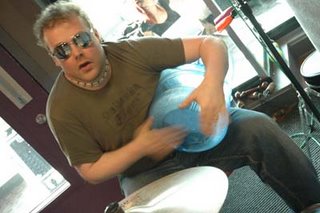Local band Boys Like Girls shuffled into the studios, carrying all their own stuff on a sunny Sunday: expensive guitars, synthesizing machines for beeps and boops, a big drum kit. There were no photographers: this was a low-profile interview. In the outside world, the World Cup was dominating everyone's attention (I know this dates the review: this was buried in the backwaters of WERS.org for a month before I found it), but I was curious to see how this band would conduct themselves. Their pants were very tight. Their shirts were very tight. They all had keys on their belts, for some reason (is this an emo thing I don't know about?). They all seemed to take themselves very seriously, except for the drummer, John Keefe, who smiled haggardly at me every time Martin Johnson called for a retake. This band photo exemplifies their vibe:

(photo courtesy of MySpace.com)
Martin Johnson: in the front, staring you in the face. John Keefe: to the left, weird expression on his face, like he doesn't know or care that the camera is there. Paul DiGiovanni: in the back, acting mysterious, with a Flock of Seagulls tribute hairdo. Brian Donahue: to the right, with a long flowing mane that gives the band name "Boys Like Girls" its more feminine skew.
Johnson seemed to want us to believe he knew a fair amount about recording. He did, for a rookie performer, but it still made him nervous. A weary energy settled into the studio that day as they laid down, painstakingly, the two tracks that they were marketing as singles. And after they all left, in my mind it sounded as though they were still starting the song over and over--I couldn't get it out. So I wrote this about the band:
With an audience that overlaps Avril Lavigne and a collective style that recalls Boy George, Boys Like Girls are poised to launch the next great plaintive youth anthem on the American music scene. It's called "Dancehall Drug," a track that takes a young girl to task for growing up too fast. Although the Boston boy band has only played one tour as yet (with Internet superstars Cute is What We Aim for) they've seen plenty of female fans ready to “lose it all” at their shows—and unlike other bands on their way to fame, the members of Boys Like Girls aren't sure they like it.
It's strange to see young teenage girls all dressed up at their shows, says Martin Johnson, guitarist and lead vocalist for BLG. He can't help feeling, he says, "They should be at home doing their homework." So he penned the song that he would then hone like a perfectionist to a precise pitch and whine. With vocals from Johnson, bassist Bryan Donahue and guitarist Paul DiGiovanni, backed by heavy drums by John Keefe, the song thunders along, an anthem at turns both crooning and caterwauling (and yes, it's emo—but it's really catchy!).
In the age of Avril (whom the boys refer to by first name only), not to mention Britney, it seems odd that it should take a boy band to reel in the masses of girls who still go groupie at the sight of a well-coiffed quartet of teenage rockers. But one only has to visit the boys' MySpace pages to see that the poor boys—all hip twenty-somethings dressed, as the band name might suggest, in tight jeans and pink t-shirts—are truly inundated with fans' love letters. Something had to be done.
But even though sex usually sells, this moralistic song might as well. There's something eminently marketable about the local band—with viral riffs sunk into the songwriting and Johnson's earnest vocals, their songs are impossible to shake. And we're not the only ones who think so: their label, Red Ink/Columbia, has arranged to film a video for the song to be released on the Internet, currently the musicians' most popular milieu, and they'll be releasing it on their self-titled album on August 22. They're also headed off on tour with Butch Walker, lyricist for such entities as—you guessed it—Avril, which will take them through the Midwest and back to Boston for a July 28 show at Axis. Until then, get your fix of “Dancehall Drug” live on WERS.
http://www.myspace.com/boyslikegirls
-Ryan Weaver
















